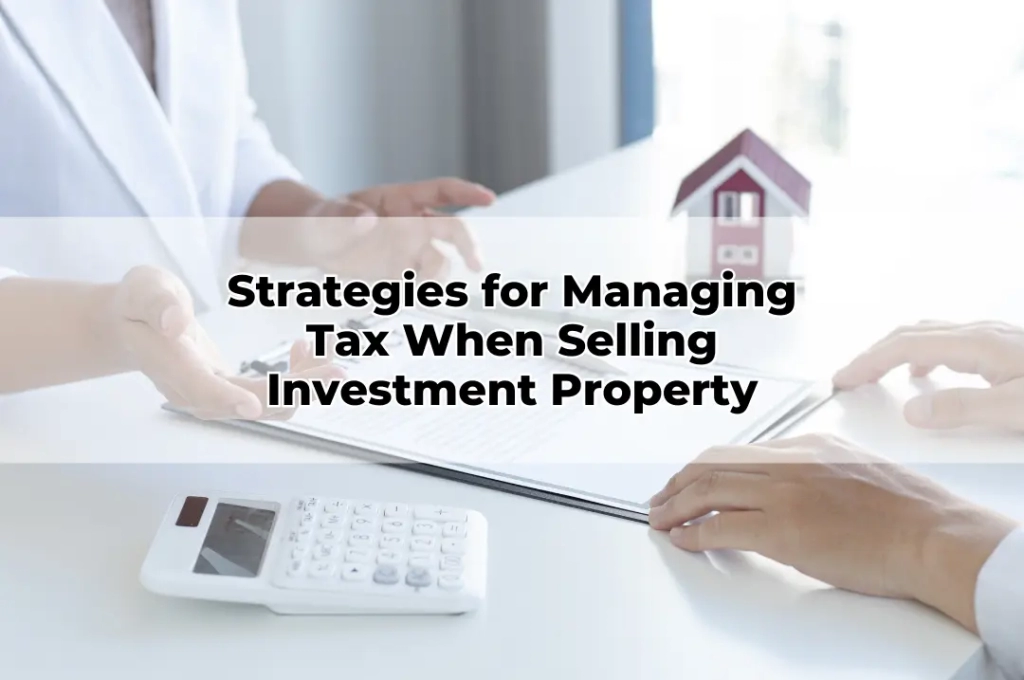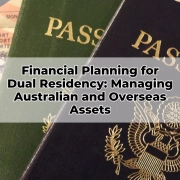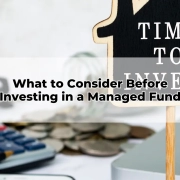Strategies for Managing Tax When Selling Investment Property
Table of Contents
ToggleSelling an investment property can trigger a cascade of tax considerations that may significantly impact your financial outcomes. Understanding these implications is paramount. In Australia, capital gains tax (CGT) typically applies when you sell an investment property for more than its purchase price. Many property investors are surprised at how substantially CGT can erode their profits. As a Toowoomba Financial Adviser, I always stress the necessity of pre-sale tax planning to clients. By preparing ahead, you can structure your finances to minimise liabilities and safeguard your returns. Financial Planning Toowoomba strategies must integrate precise tax forecasting and compliance measures to avoid unpleasant surprises post-sale.
Capital Gains Tax (CGT)
Capital Gains Tax is not a standalone tax; rather, it is part of your income tax. If you make a gain from selling an investment property, it is added to your taxable income. In Australia, property held for more than 12 months may qualify for a 50% CGT discount for individuals, but eligibility conditions apply. Calculating your capital gain requires a thorough understanding of your property’s cost base-purchase price, acquisition expenses, and any capital improvements. Professional advice from an Online Financial Adviser ensures accurate CGT calculations, maximising your ability to leverage available concessions.
Importance of Timing Your Sale
When you choose to sell an investment property can have a profound impact on your tax liability. Timing the sale to coincide with a year of lower income could reduce your marginal tax rate, thus lessening your CGT exposure. Strategic timing is a hallmark of prudent Retirement Financial Advice. It can mean the difference between a manageable tax bill and an unexpectedly hefty liability. In Toowoomba Financial Planning circles, optimal sale timing is considered a fundamental tax management technique.
Maximising the CGT Discount
Holding an investment property for at least 12 months before selling is crucial to access the 50% CGT discount for individuals and trusts. This discount can halve the taxable portion of your gain, making a tangible difference to your end profit. However, timing alone is insufficient-you must ensure all recordkeeping requirements are met. Detailed acquisition and improvement records must be maintained to substantiate your cost base. Seeking advice from a Toowoomba Financial Adviser early in your property ownership journey ensures that you position yourself to maximise this valuable concession.
Calculating Your Cost Base Accurately
The cost base of your investment property extends far beyond the purchase price. It includes stamp duty, legal fees, agent commissions, and even certain holding costs under particular circumstances. Accurately documenting these expenditures is crucial to reducing your capital gain and, consequently, your CGT liability. An incomplete or poorly compiled cost base calculation can lead to overpayment of tax. Engaging a qualified Online Financial Adviser to assist with precise documentation is an investment in preserving your wealth.
Pre-Sale Property Expenses and Their Benefits
Certain costs incurred before selling your property-such as repairs and marketing expenses-may be deductible. However, the Australian Taxation Office (ATO) draws a clear distinction between deductible repairs and capital improvements, which must be added to your cost base instead. Understanding this distinction is critical. Claiming deductions incorrectly can attract penalties and interest. Robust Financial Planning Toowoomba practices involve reviewing all potential deductions ahead of sale to ensure compliance and optimal tax outcomes.
Using Capital Losses to Offset Gains
Capital losses incurred from other investments can be offset against your capital gains to reduce your overall taxable income. Unused capital losses can also be carried forward to future years indefinitely. A well-crafted strategy involving the strategic realisation of losses can significantly cushion your CGT exposure when selling property. This technique, often overlooked by self-managed investors, underscores the value of engaging a seasoned Toowoomba Financial Adviser for a holistic tax management approach.
Considering Main Residence Exemptions
In some circumstances, an investment property may qualify for partial main residence exemptions under Australian tax law. For instance, if the property was your principal place of residence before it was rented out, a partial CGT exemption may apply. The ‘six-year rule’ can also permit temporary absences while renting out your home without losing the CGT exemption. Expert Retirement Financial Advice can help you navigate these intricate provisions and claim maximum entitlements without crossing regulatory lines.
The Role of Trusts and Ownership Structures
The ownership structure of your investment property significantly influences your tax outcomes. Properties held through discretionary trusts, companies, or SMSFs (Self-Managed Superannuation Funds) are subject to different tax treatments. Each structure has unique advantages and limitations, particularly regarding CGT concessions and liability exposure. Before selling, it’s imperative to review your structure’s tax implications carefully. Engaging a Toowoomba Financial Adviser with expertise in structuring can lead to material tax savings and more flexible wealth management options.
GST and Selling Investment Properties
Goods and Services Tax (GST) can be a sleeper issue for investment property sellers. If you are registered for GST and the property is sold as part of a business activity, GST may apply. This is particularly relevant for properties developed for sale. Understanding whether the “going concern” exemption or the margin scheme applies is essential. Getting it wrong can incur additional liabilities. Financial Planning Toowoomba strategies ensure GST obligations are correctly identified and factored into sale negotiations to protect your net proceeds.
Strategic Gifting and Family Transfers
Selling or transferring investment property within a family group requires meticulous planning. Gifting property may trigger CGT as if sold at market value, regardless of any monetary consideration. Strategic gifting can be part of broader estate planning or retirement strategies but must be executed with full awareness of the tax ramifications. A sophisticated Online Financial Adviser approach involves timing, valuation, and documentation to manage tax exposure effectively.
Superannuation Contributions and Downsizer Opportunities
Selling an investment property provides an opportunity to bolster your retirement savings strategically. The Australian Government’s downsizer contribution scheme allows eligible individuals aged 55 or older to contribute up to $300,000 from property sale proceeds into superannuation without counting towards normal contribution caps. This initiative provides a rare chance to boost tax-advantaged retirement savings. Seamlessly integrating such contributions into your broader Retirement Financial Advice strategy can greatly enhance financial security in later life.
Managing Tax Payment and Instalments
Large capital gains can trigger substantial tax bills, often payable long before the liquidity from the sale is fully deployed or reinvested. Planning ahead for this liability is crucial to avoid cash flow stress. Tax instalments or varied PAYG (Pay As You Go) arrangements can assist. Setting aside sale proceeds for tax obligations is a best-practice financial management technique recommended by seasoned Toowoomba Financial Advisers. Pre-emptive planning ensures you meet your obligations without disrupting your broader financial goals.
Working With a Financial Adviser for Tax Management
Managing tax when selling an investment property demands foresight, expertise, and a nuanced understanding of Australia’s complex tax regime. A professional adviser provides invaluable guidance in optimising tax outcomes, navigating legal pitfalls, and ensuring long-term wealth preservation. Collaborating with a Toowoomba Financial Adviser specialising in property and tax strategies places you in the strongest possible position to maximise the benefits of your investment journey while mitigating risks. Strategic advice turns complex tax challenges into opportunities for growth and security.









